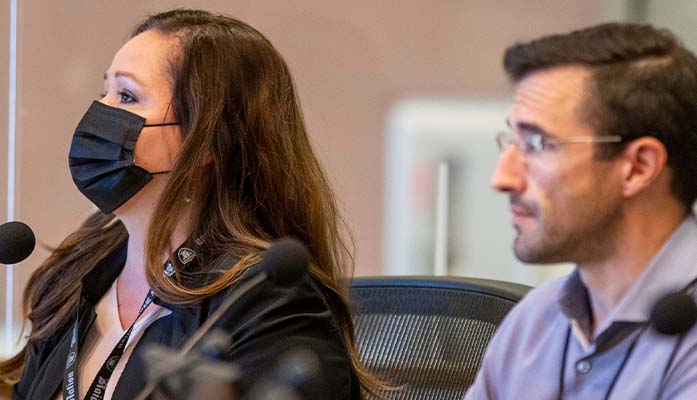
by Matthew Holloway | Jul 20, 2025 | News
By Matthew Holloway |
Former Pima County Supervisor and daughter of late Arizona Democratic Congressman Raúl Grijalva, Adelita Grijalva, defeated her fellow Democrats to win the 7th Congressional District nomination. Grijalva was armed with the endorsements of Democrat Socialists of America (DSA) darling Rep. Alexandria Ocasio-Cortez (D-NY), self-avowed socialist Senator Bernie Sanders (I-VT), and a major ad-spend and endorsement from the Working Families Party (WFP). Both Democrat leaders and the WFP also endorsed socialist New York City Mayoral Candidate Zohran Mamdani.
As previously reported by AZ Free News, Grijalva opted to run for her late father’s congressional seat with Tucson Mayor Regina Romero declining to run in order to chair the Grijalva campaign.
“At a time when Trump, Musk, and their billionaire gang are attacking our democracy and ripping off the working class, we need leaders who have the backbone to take them on,” Sanders said in a statement in April. “That’s why I’m proud to endorse Adelita Grijalva for Congress. Adelita understands that real change never comes from the top down, it comes from the bottom up.”
Described as Sanders’ “Progressive Protégé,” by the Maricopa County Republican Committee, Grijalva also proudly boasted of her endorsement by Democratic Socialists of America member Rep. Alexandria Ocasio-Cortez.
Grijalva also enjoys the endorsement of the openly socialist WFP with Maurice Mitchell, National Director of the Working Families Party, saying Tuesday, “Adelita’s victory tonight isn’t just a win for families in Southern Arizona. It’s a win for all those who believe in a government that works for everyday people. Voters are tired of politicians who hide in the pockets of their billionaire donors. We know that Adelita is going to be a fearless fighter for working families in her district.”
According to the WFP website, the party spent significantly on ads in the CD7 race, writing “The Party was a significant force in the race, spending $221,000 on several ads for TV, digital, and sending thousands of texts to voters. Along with our union and grassroots partners, we knocked on more than 90,000 doors and sent two direct mail pieces to likely voters in the district.”
The party also credited itself with the victories of Zohran Mamdani as well as Mayoral races in Buffalo, Syracuse, and Albany. WFP has historically supported members of ‘The Squad,’ the most radical leftists in Congress, including Reps. Ayanna Pressley, Rashida Tlaib, and Jamaal Bowman. Grijalva will face Republican candidate Daniel Butierez in a Special Election on September 23rd.
Matthew Holloway is a senior reporter for AZ Free News. Follow him on X for his latest stories, or email tips to Matthew@azfreenews.com.

by Ethan Faverino | Jul 20, 2025 | News
By Ethan Faverino |
The Arizona Governor’s Office along with Arizona Department of Public Safety (AZDPS) are addressing the issue of growing concern nationwide of individuals impersonating law enforcement officers.
These deceptive acts not only undermine public trust with law enforcement officials, but they also jeopardize the safety of the community.
Under the Arizona Revised Statutes §13-2411, impersonating a police officer with the intent to deceive or induce compliance is a class 6 felony.
If committed during another felony, such as assault or theft, the offense escalates to a class 4 felony.
Director of AZDPS, Colonel Jeffrey Glover, said, “Impersonating a law enforcement officer is a serious crime that undermines public trust and threatens community safety. Our agency is committed to rigorously investigating and prosecuting anyone who falsely presents themselves as a peace officer. We will not tolerate individuals who exploit the authority and image of law enforcement for criminal or deceptive purposes.”
Governor Katie Hobbs also affirmed this same belief by saying, “Our local and state law enforcement have a tough job to do. Impersonating them makes that job even tougher. It puts our officers in harm’s way, undermines public trust, and makes our communities less safe. Impersonating a law enforcement officer is a felony in Arizona, and anybody caught doing so will be charged to the fullest extent of the law.”
The Governor’s office and AZDPS urge the public to remain vigilant and offer the following tips to identify and respond to potential impersonators:
- If driving, pull over in a well-lit, populated area.
- Request identification because legitimate officers carry authorized credentials identifying themselves and their agency.
- Call 911 to verify the encounter.
- Note details like vehicle type, license plate number, or badge number.
- Stay calm to ensure clear thinking and safe decision making.
Anybody who believes they have encountered a law enforcement impersonator is urged to report the incident to the local authorities immediately providing as much information as possible.
Ethan Faverino is a reporter for AZ Free News. You can send him news tips using this link.

by Jonathan Eberle | Jul 19, 2025 | News
By Jonathan Eberle |
The Goldwater Institute has filed a federal lawsuit against the Equal Employment Opportunity Commission (EEOC), demanding answers about an ongoing government case targeting a California-based moving company with a $15 million fine for alleged age discrimination.
At the center of the dispute is Meathead Movers, a family-owned business founded in 1997. The company has grown into California’s largest independently owned moving company, employing more than 300 workers. Its business model emphasizes physical endurance and customer service, with employees jogging to and from trucks when not carrying furniture.
The EEOC launched an investigation into Meathead Movers in 2017, accusing the company of discriminating against older applicants and using marketing materials that allegedly promote age bias. The case is unusual because it is an “agency-initiated” lawsuit—meaning the EEOC filed it without an official complaint from an alleged victim. The EEOC only pursues a small number of such cases each year.
According to the Goldwater Institute, that lack of a public complaint is precisely why the group is now suing the federal government. In March, the Institute submitted a public records request asking the EEOC to disclose whether any individuals had actually filed complaints against Meathead Movers and whether similar actions had been taken against other companies. The EEOC denied the request, citing privacy concerns.
The Goldwater Institute argues that the refusal to disclose this information violates federal transparency laws. “Privacy is for individuals, not government agencies,” the Goldwater said in a statement. “Transparency is a legal requirement, especially when taxpayer-funded agencies wield their power against private businesses.”
Critics of the EEOC’s case say the lawsuit defies common sense. Moving companies, by nature, require employees capable of lifting heavy furniture and working long hours in physically demanding conditions. The Goldwater Institute points out that Meathead Movers has employed workers of all ages and argues there is no evidence of systemic discrimination.
“This isn’t just about one company,” said a spokesperson for the Goldwater Institute. “If the government can pick a successful business, launch a multimillion-dollar enforcement action without an actual complaint, and then refuse to explain why, it sets a dangerous precedent for small businesses everywhere.”
As the lawsuit moves forward, the Goldwater Institute says it will continue to press for the release of records, arguing that public accountability is at stake.
Jonathan Eberle is a reporter for AZ Free News. You can send him news tips using this link.

by Matthew Holloway | Jul 19, 2025 | News
By Matthew Holloway |
A quiet battle has been raging over the groundwater of the Hualapai Basin between Arizona State Representative John Gillette (R-LD30) and Mohave County Board of Supervisors Chairman Travis Lingenfelter.
Gillette has alleged that Lingenfelter enjoys the support of Governor Katie Hobbs, and High Ground, LLC., a firm “closely tied to the Walton Family Foundation and Environmental Defense Fund.”
In an email to AZ Free News, Rep. Gillette stated that Lingenfelter “has ‘cozied up’ with Governor Hobbs and High Ground, LLC., not by joining their party, but by aligning on a policy platform that places rural water in the hands of the Governor. He has advocated for several of the leftists’ water bills that trample the rights of property owners.”
The controversy appears to have arisen around the Final Assessment of the Hualapai Basin Water Data Integrity issued by Gillette to fellow legislators and third-party reviewers, which was allegedly made public by Lingenfelter in a May 8, 2025, formal rebuttal.
In his final assessment, Gillette wrote, “After continued research, legislative engagement, and review of both historical and current data, my original 2021 assessment of the Hualapai Basin water situation remains valid. The data presented by the City of Kingman and Mohave County remains suspect, with indications of overstatement used to drive political narratives and policy agendas.”
In the assessment, which Rep. Gillette asserted was reviewed by “three independent scientific and policy bodies prior to publication,” he found:
- The Hualapai Basin has enough groundwater storage to supply the region for 100–300+ years, even under heavy usage.
- Forecast models were based on worst-case pumping assumptions and should not be used to justify alarmist policy actions.
- Recharge estimates, storage volumes, and historical withdrawal rates all point to significant long-term water availability.
- The City of Kingman and Mohave County appear to have overstated risks—possibly to justify control over water rights or block agricultural competitors.
In the formal rebuttal dated May 8th, Lingenfelter addressed Gillette and claimed, “Your letter unfortunately contains a series of flawed assumptions, technical inaccuracies, and mischaracterizations that misinform rather than advance the public dialogue around long-term rural groundwater sustainability in Mohave County.”
He added, “Your letter asserts that data presented by Mohave County and the City of Kingman remains ‘suspect’ and ‘politically compromised.’ Such a characterization is categorically false and impugns the reputations of Mohave County, City of Kingman, and credentialed hydrologists at the ADWR and USGS and the public they serve.”
Responding to Lingenfelter’s rebuke in a formal response on May 16th, Gillette wrote, “While I welcome constructive dialogue, your letter reflects a degree of emotional overreach rather than a calm, scientific response to the concerns raised. Unfortunately, it reveals more about political defensiveness than about data transparency or hydrological best practice.”
Responding to critiques of the assessment’s findings Gillette wrote, “The assessment I authored was reviewed by three independent scientific and policy bodies prior to publication. All concluded that the findings were as accurate as possible given available data. I welcome peer review. What I reject is politically motivated resistance to scrutiny. As further evidence of bias, it should be noted that the ‘comparison document’ you reference—submitted by your team only days after my final assessment—contains several confirmations of my position.”
Rep. Gillette pushed back on Lingenfelter’s assertions based on the MODFLOW-NWT model from the U.S. Geological Survey and its 75,586 adjustable parameters writing, “As any trained analyst knows, such complexity magnifies sensitivity. Even small changes in assumptions—especially politically influenced assumptions—can result in dramatic shifts in outcome. Your confidence in the model would carry more weight if you supported my proposal to recalibrate baseline figures using 15 new field test sites with controlled, non manipulated measurement inputs. This is the kind of ground-truth methodology science demands. Strangely, your rebuttal ignores this recommendation entirely.”
He further strongly criticized the veto of a bill to cap irrigation on an irrigation non-expansion area (INA) by Governor Katie Hobbs, saying the veto “executed without explanation—is further evidence that political goals are outweighing scientific governance.”
AZ Free News reached out to Supervisor Lingenfelter for a comment and received the following reply:
Thank you for reaching out. I am not aware of any dispute or controversy between the Mohave County District 1 Office and Representative Gillette’s Office as you phrase it. As Mohave County Supervisor for District 1, I have served as Mohave County’s lead on water issues for the past five years, and was actively involved in our local water policy advocacy during my prior four years on the Kingman City Council.
My responsibility is to represent the shared, official position of both Mohave County and the City of Kingman, guided by the most accurate and credible data and hydrological modeling available, based on a multi-year, science-based partnership between Mohave County, the City of Kingman, and the United States Geological Survey (USGS)—an independent agency with a long-standing reputation for being the gold standard of scientific water modeling.
The ‘Final Assessment of the Hualapai Basin Water Data Integrity’ issued by Rep. Gillette is his office’s interpretation. The County and City remain firmly grounded and unified in the professional peer-reviewed science and long-term hydrological data and modeling that have guided our efforts to protect rural groundwater and ensure sustainable water use for future generations.
As always, Mohave County, City of Kingman, and USGS look forward to jointly collaborating with all legislators on our water issues on behalf of our rural communities.”
Based upon his team’s findings, Rep. Gillette has announced his intention to pursue “a stand-alone Hualapai Basin bill—developed outside of executive influence—that reflects the data as it exists, not as it is manipulated.”
Editor’s Note: Following the filing of this report, AZ Free News was contacted by Nick Ponder, Senior Vice President of Government Affairs of HighGround Public Affairs. Mr. Ponder provided the ’Analysis of Water Constraints and Economic Growth,’ a report prepared for Mohave County by Rounds Consulting Group, and the formal rebuttal issued on May 8th by Chairman Lingenfelter to Rep. Gillette with the note: “The County, City, and USGS have been very transparent in the processes and data used in determining the water situation in the Hualapai Valley Basin. The letter and the attached analysis should reflect that robust and transparent process.”
Matthew Holloway is a senior reporter for AZ Free News. Follow him on X for his latest stories, or email tips to Matthew@azfreenews.com.

by AZ Free Enterprise Club | Jul 18, 2025 | Opinion
By the Arizona Free Enterprise Club |
Following President Trump’s directive to scrub divisive Diversity, Equity, and Inclusion programs, practices, and language from public institutions, the U.S. Department of Education sent a letter to the Arizona Department of Education (DOE) to ensure that schools comply with these requirements.
The Arizona DOE notified every school district and charter public school that they must submit a completed certification confirming compliance with the federal civil rights law. A public website was developed to track which districts and schools have completed the certification and which have not. Though the majority of schools are listed as “in compliance,” the question remains: have they all truly purged their websites and learning environments of DEI practices? A quick review and some basic research suggest that not all these schools are fully committed to the removal of this woke material.
Alhambra Elementary School District in Phoenix has a subcommittee titled “Culture, Conditions, & Climate” with a stated need to “increase its Diversity, Equity, Inclusion capacity to ensure it is an inclusive environment.” The district plans to achieve this by subjecting staff to DEI trainings designed to establish that these adults teaching your children become anti-racist activists.
Recently, Scottsdale Unified School District has been the center of controversy surrounding their adoption of new textbooks that teach about George Floyd, Black Lives Matter, and anti-law enforcement rhetoric. Arizona Superintendent of Public Instruction Tom Horne has spoken out against this anti-American, DEI-infested curriculum, emphasizing that schools must steer clear of promoting an “unbalanced political agenda.”
In Glendale, the Washington Elementary School District has published a “Statement of Commitment to Educational Equity,” in which it outlines how DEI principles are integrated into its educational framework.
In an application for federal charter school start-up grants for 2024-2028, Desert Sage High School in Tucson declares its commitment to “diversity, equity, inclusion, anti-bias education, and social justice.” Among its goals is increasing the percentage of Hispanic and Native American students—an effort aimed more at virtue signaling just to demonstrate how unbiased they really are.
Several other schools maintain overreaching non-discrimination statements that include “gender identity” and “sexual orientation,” and some keep DEI in their mission statements.
And these are just the districts and schools that claim to comply with the federal civil rights law…
>>> CONTINUE READING >>>





